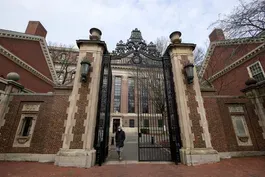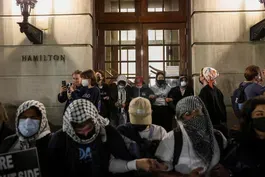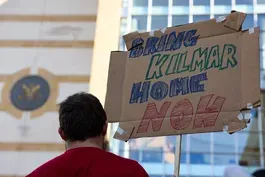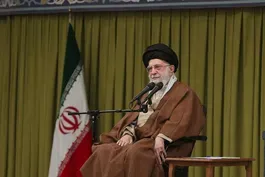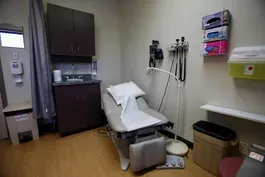
China cuts exports of rare earth minerals amid trade war
Clip: 4/15/2025 | 7m 37sVideo has Closed Captions
China cuts exports of vital rare earth minerals as trade war with U.S. intensifies
China’s leader is touring Southeast Asia and portraying Beijing as the anchor of world economic stability. Xi Jinping’s efforts come after the U.S. levied a blanket 10 percent tariff on goods coming in and steeper rates on China. Beijing is now restricting the export of minerals critical to everything from American cell phones to fighter planes. Nick Schifrin discussed more with Gracelin Baskaran.
Problems with Closed Captions? Closed Captioning Feedback
Problems with Closed Captions? Closed Captioning Feedback
Major corporate funding for the PBS News Hour is provided by BDO, BNSF, Consumer Cellular, American Cruise Lines, and Raymond James. Funding for the PBS NewsHour Weekend is provided by...

China cuts exports of rare earth minerals amid trade war
Clip: 4/15/2025 | 7m 37sVideo has Closed Captions
China’s leader is touring Southeast Asia and portraying Beijing as the anchor of world economic stability. Xi Jinping’s efforts come after the U.S. levied a blanket 10 percent tariff on goods coming in and steeper rates on China. Beijing is now restricting the export of minerals critical to everything from American cell phones to fighter planes. Nick Schifrin discussed more with Gracelin Baskaran.
Problems with Closed Captions? Closed Captioning Feedback
How to Watch PBS News Hour
PBS News Hour is available to stream on pbs.org and the free PBS App, available on iPhone, Apple TV, Android TV, Android smartphones, Amazon Fire TV, Amazon Fire Tablet, Roku, Samsung Smart TV, and Vizio.
Providing Support for PBS.org
Learn Moreabout PBS online sponsorshipWILLIAM BRANGHAM: Tonight, President Trump launched a new national security investigation that could lead to tariffs over critical minerals, the vast majority of which are processed by China.
The president's announcement comes after Beijing restricted exports of those minerals, which are essential for everything from cell phones to fighter planes.
Nick Schifrin reports that the trade wars are playing out as Chinese leader Xi Jinping is touring Southeast Asia, portraying Beijing as the region's most reliable partner.
NICK SCHIFRIN: In Vietnam, they brought the pomp and circumstance to welcome Xi Jinping, and two communist leaders walked the red carpet so Beijing could portray itself as a benevolent source of regional stability.
LIN JIAN, Chinese Foreign Ministry Spokesperson (through translator): China will insist on joining hands, rather than throwing punches, tearing down walls instead of building barriers, connecting, instead of decoupling.
NICK SCHIFRIN: Xi's Southeast Asia tour was preplanned, but he's using it to confront the U.S. for what Beijing calls an irresponsible trade war and recent sanctions on Hong Kong, China's top official there said today.
XIA BAOLONG, Director, Hong Kong and Macau Affairs Office (through translator): The repeated attempts of the U.S. to contain and suppress Hong Kong will backfire and harm itself, and those peasants from the U.S. will soon be crying tears in front of China's 5,000 years of civilization.
NICK SCHIFRIN: That confrontation at the U.S. now extends to critical minerals.
Beijing is restricting the export of rare earths and magnets that are almost entirely refined by China, those minerals vital for everything from the U.S. military's most advanced fighter jets to missiles to every single cell phone and electric vehicle on the planet.
For perspective on all this, we turn to Gracelin Baskaran, a mining economist and director of the Critical Minerals Security Program at the Center for Strategic and International Studies, a think tank in Washington.
Thanks very much.
Welcome to the "News Hour."
GRACELIN BASKARAN, Center for Strategic and International Studies: Thank you for having me.
NICK SCHIFRIN: Let's start with a basic fact.
The White House says that 70 percent of U.S. imports of rare earths come from China.
Translate that for me.
How dependent is U.S. and allied military and civilian technology on China?
GRACELIN BASKARAN: We're highly dependent on China.
Consider that we don't have any heavy rare earth processing facilities here at home.
So, ultimately, while we have reserves of rare earths, even when we extract them, they actually go back to China for the midstream processing and potentially the manufacturing of magnets.
And these rare earths are absolutely vital for all of our defense technologies and civilian uses, from MRI scanners to electric vehicles.
So it's extremely consequential to our security.
NICK SCHIFRIN: We have been talking for years, of course, about critical minerals as vital to all technology.
But what we're talking about here today, what China is trying to restrict are very specific subset of critical minerals, rare earths, things like scandium, terbium, things that most people have never heard of.
So explain how these particular rare earths are so critical and why.
GRACELIN BASKARAN: So rare earths are actually a bit of a misnomer, because they're not rare.
They're actually everywhere.
However, they're often found in small quantities and then they get separated out of the rock before they get processed and manufactured into the critical goods that we discuss.
Now, the big difficulty that we have is that we have fallen behind in critical minerals.
And rare earths have often been -- have long been weaponized.
So I think back to 2010.
China and Japan got into a fishing trawler dispute and then they were cut off.
What happened with this new announcement is that heavy rare earths were targeted.
So we have critical minerals, we have rare earths and then we have heavy rare earths.
And these heavy rare earths all go to China.
So 100 percent of separation for these rare earths are being done there.
NICK SCHIFRIN: So Beijing in the past has restricted some of these exports, as you just mentioned, but they're taking additional steps in the last week in response to the U.S. pressure when it comes to trade.
What are these additional steps and are the actual restrictions?
Or can companies apply and actually get China to approve these exports?
GRACELIN BASKARAN: So, as you said, there's a kind of a runway of policies here when we come to export restrictions right?
First of all, there's going to be a pause in exports while they get a licensing system in place.
Second, it is -- a licensing requirement is actually a dynamic tool, which means that I can change who gets licenses and how much they're licensed to export, which gives them a lot of negotiating power.
And then the third thing to note about licensing is, it could be tightened quite significantly as the trade war escalates and it could ultimately come down to a ban.
We have already seen that 15 defense and aerospace companies in the U.S. are no longer able to access dual-use goods from China, which means they will not be able to use these rare earths that come from there.
NICK SCHIFRIN: The flip side is, how dependent is China itself on these exports?
Do we know whether China might use this as a negotiating ploy when it comes to the Trump administration and trade pressures, or is there an interest from Beijing in having these export controls be permanent?
GRACELIN BASKARAN: It's going to be a negotiating tool.
Everything feels like a negotiation in the new political era.
The reality is that a ban would be very consequential to the Chinese economy, because not only is it a mining and processing.
It's the entire economic ecosystem in infrastructure services that go with it that would ultimately come to a halt.
What it does do is, it gives them power in a tariff war, because they actually have an absolute advantage here.
It's not comparative.
So the idea is that, by -- if the tariffs come back down to a more reasonable level, it stimulates their economy, but ensures that we have access to this very critical material.
NICK SCHIFRIN: Let's talk about future possible alternatives to Beijing.
The United States government is investing in facilities here in the U.S.
It's invested in a facility in South Africa.
It's considering investing in Brazil.
Is there an alternative when it comes to these rare earths to Beijing?
GRACELIN BASKARAN: We're probably not going to decouple any time soon.
We have been mining rare earths for some years in the United States, but we have never built separation facilities that are -- and so, even though the U.S. government has spent over $400 million through the Defense Production Act over the last five years, these facilities are not ready to go.
And when they are online, they're only going to be able to produce a small fraction of what China produces.
Ultimately, for the U.S., what determines whether the U.S. fails or succeeds here is twofold.
One will be, can we get these facilities online quickly?
And the second is, at the end of the day, geology is where geology is.
And we have less than 1.5 percent of the world's rare earths here at home in the U.S.
So there's going to be a need to link this up to our foreign policy to secure rare earths from other countries.
We have seen it feature quite prominently in the discussion in the last few months in the context of potential engagement with Ukraine and Greenland.
There are many other sources of rare earths.
And as we have seen, even with the Chinese president in Vietnam and Malaysia, they are looking to do the same thing to cement a certain dominant.
So there's a larger strategy that's needed.
And there's no doubt the Department of Defense recognizes this as a critical vulnerability.
They have prioritized what we call the mine-to-magnet supply chain and building it here at home by 2027.
But it takes time, it takes capital, and it takes a lot of willpower.
NICK SCHIFRIN: Gracelin Baskaran, thank you very much.
GRACELIN BASKARAN: Thanks for having me.
Grants frozen as Harvard pushes back against Trump's demands
Video has Closed Captions
Clip: 4/15/2025 | 6m 41s | Billions in grants frozen after Harvard pushes back against Trump's demands (6m 41s)
How college communities are reacting to funding threats
Video has Closed Captions
Clip: 4/15/2025 | 5m 34s | How college communities are reacting to funding threats, international student arrests (5m 34s)
Inside the camp where Sudanese refugees have fled civil war
Video has Closed Captions
Clip: 4/15/2025 | 9m 57s | Inside the crowded camp where Sudanese refugees have fled violence and hunger (9m 57s)
Judge presses DOJ on wrongfully deported man
Video has Closed Captions
Clip: 4/15/2025 | 8m 54s | Judge presses Trump administration on why it hasn't returned wrongfully deported man (8m 54s)
News Wrap: Iran leader downplays chance of nuclear deal
Video has Closed Captions
Clip: 4/15/2025 | 4m 58s | News Wrap: Iran's supreme leader downplays chance of deal from nuclear talks with U.S. (4m 58s)
Why abortions are rising in U.S. despite more restrictions
Video has Closed Captions
Clip: 4/15/2025 | 7m 11s | Why abortions are rising in the U.S. despite more restrictions (7m 11s)
Providing Support for PBS.org
Learn Moreabout PBS online sponsorshipSupport for PBS provided by:
Major corporate funding for the PBS News Hour is provided by BDO, BNSF, Consumer Cellular, American Cruise Lines, and Raymond James. Funding for the PBS NewsHour Weekend is provided by...
